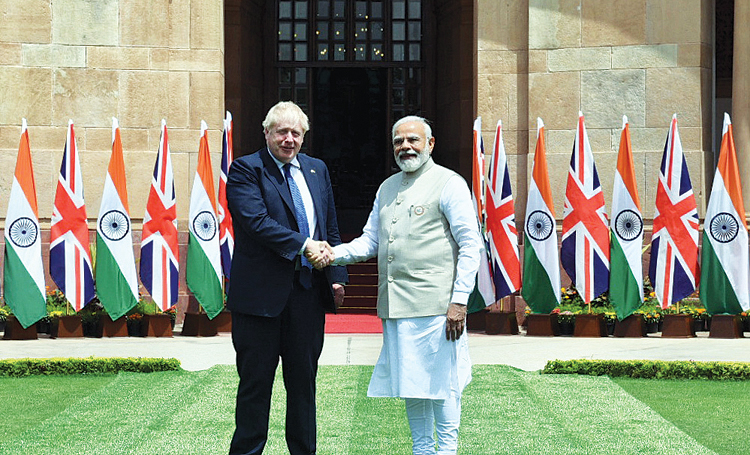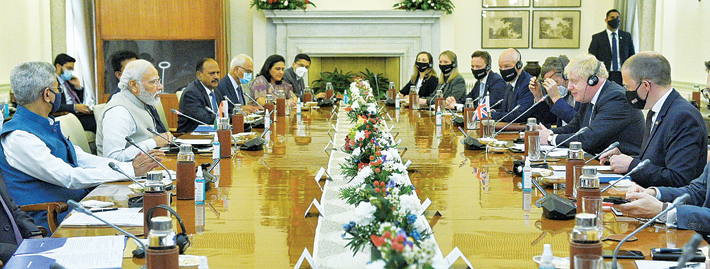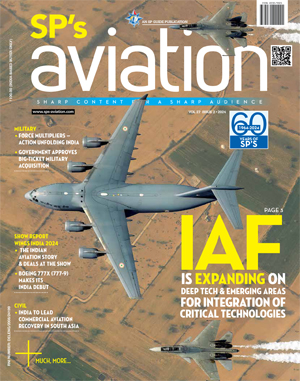INDIAN ARMED FORCES CHIEFS ON
OUR RELENTLESS AND FOCUSED PUBLISHING EFFORTS

SP Guide Publications puts forth a well compiled articulation of issues, pursuits and accomplishments of the Indian Army, over the years

I am confident that SP Guide Publications would continue to inform, inspire and influence.

My compliments to SP Guide Publications for informative and credible reportage on contemporary aerospace issues over the past six decades.
India and UK – Re-energising Strategic Relations
“We have discussed next generation defence and security collaboration in all five domains. We have agreed to work together to meet new threats across land, sea, air, space and cyber including partnering on new fighter jet technology, maritime technologies to detect and respond to threats in the ocean”, said Prime Minister Boris Johnson during his visit to India.

In a fast changing geo-strategic landscape, India and UK have once again revitalised their strategic equations, which already were put on a higher trajectory during the May, 2021 virtual summit with a ten year ‘Roadmap 2030’, primarily focussing on five priority areas including defence, cyber security, trade and economy and people to people relations. During last two years, Covid-19 pandemic had twice deprived the British Prime Minister Boris Johnson, the opportunity to make his first Prime Ministerial visit to India. His third attempt, successful this time, to personally visit India on April 21-22, happened in an entirely changed world scenario due to the Russian military invasion in Ukraine. In this post Ukraine divided world, strategic equations have gone topsy-turvy and in view of the new emerging alignments, the coming closer of two great democratic powers will add to the strength of the Indo-Pacific alliances, whose undeclared goal is to challenge the rise of an aggressive China.
The public bonhomie that marked talks between Prime Minister Johnson and Prime Minister Modi underlined the growing convergence of interests between UK and India and a serious political commitment to translate the shared interests into concrete outcomes. The world scene has been dramatically altered after the Roadmap 2030 was finalised. But in the changed geo-political context, this roadmap appears to be very appropriately drafted and has great relevance in the present context, to push forward the Comprehensive Strategic partnerships with greater vigour, to jointly protect shared strategic interests to keep the Indo-Pacific arena free of coercion by one power (read China) and to ensure that rule of law prevails in the maritime area. With China and Russia along with few other smaller states in one camp and US, UK, Australia and Japan along with European powers in the other camp, India finds itself comfortable in the western camp, though unable to snap the umbilical cord with Russia, because of its historically close proximity and excess dependence on Russian origin weapon systems and platforms. At a time when Indian armed forces are directly confronting Chinese forces on the border of Eastern Ladakh, India finds itself critically dependent on Russian defence systems and hence cannot draw the ire of the fire-emitting Russian President Vladimir Putin, by directly condemning Russian action.
PM Modi welcomed UK’s decision to join the Indo-Pacific Oceans Initiative (IPOI) and colead the pillar on Maritime Security to promote regional coordination and cooperation for securing and protecting the Indo-Pacific maritime domain
Prime Minister Johnson was mindful of India’s predicament, hence avoided lecturing India on its Ukraine policy. The western world realises that India cannot be forced to downgrade its strategic partnership with Russia, but they certainly can help India in gradually reducing its dependence on Russian defence systems by helping indigenise Indian defence industry with local co-production and co-development of weapon systems.
To promote this goal, the UK PM made lot of promises and commitment, expressed publicly by him and in the joint statement. According to Boris Johnson, “We have discussed next generation defence and security collaboration in all five domains. We have agreed to work together to meet new threats across land, sea, air, space and cyber including partnering on new fighter jet technology, maritime technologies to detect and respond to threats in the ocean.”
It is well known that Indian Aeronautical Development Agency (ADA) under the Defence Research and Development Organisation (DRDO) has an ambitious programme to develop an Advanced Medium Combat aircraft (AMCA) for Indian Air Force. UK’s offer to partner with India in new fighter jet technology is thus very relevant. UK has produced modern fighters and its most advanced engines, hence Indian Aeronautical Agency would appreciate a helping hand from UK engineers to fast track the development programme of AMCA. UK made Jaguar Deep Penetration Strike Aircraft and Hawk trainer aircrafts are shining examples of India-UK defence cooperation in aviation sector. India also needs advanced maritime technologies which Britain can offer.
Boris Johnson also said, “to support greater defence and security collaboration with India over the coming decade, United Kingdom will issue an Open General Export License (OGEL) to India reducing bureaucracy and shortening delivery times for defence procurement.” UK has extended this facility for the first time in the Indo-Pacific region.

With a declared commitment to step up security cooperation in Indo-Pacific, Johnson and Modi expressed their desire to steer bilateral relations towards a ‘Vision 2047’ for shared security and prosperity of their people. The two countries reiterated their commitment to transform defence and security cooperation as a key pillar of the India-UK Comprehensive Strategic Partnership and enhance engagements in support of a free, open and secure Indo-Pacific.
In this context, Johnson and Modi welcomed the progress made on their commitments in the 2030 roadmap. To achieve its objectives, both countries have increased their joint programme and high profile visits like the successful tour of UK’s Carrier Strike Group (CSG) to India in October 2021. In addition to this the first tri-service exercise between UK and Indian forces were organised besides the confidence enhancing step of the inclusion of the UK’s Liaison Officer in India’s Information Fusion Centre, and the first annual India-UK Maritime Dialogue.
To resolve legacy issues both the countries have agreed to deepen co-operation, and intensifying dialogues as trusted partners under the India-UK Defence and International Security Partnership framework. During the talks Johnson and Modi welcomed the finalisation of the Letter of Arrangement between the UK’s Defence Science & Technology Laboratory and India’s Defence Research & Development Organisation to help deliver advanced security capabilities through joint-research, co-design, co-development and joint production of defence technology and systems - particularly in key and emerging military technologies. In that regard they welcomed the establishment of a Joint Working Group on India-UK Electric Propulsion Capability Partnership with the goal of fostering military and industrial collaboration in maritime Electric Propulsion systems.
According to the joint statement, the leaders noted the importance of robust defence industrial collaboration for manufacturing of defence equipment, systems, spare parts, components, aggregates and other related products and key capabilities, under the ‘Make in India’ programme through codevelopment, indigenisation, transfer of technology and setting up of joint ventures for meeting the needs of the Armed Forces of India and other countries. They noted cooperation in key areas of strategic collaboration including Modern Fighter Aircraft and Jet Engine Advanced Core Technology. Both sides agreed to work bilaterally and with key partner countries to facilitate highest level access to technology to Indian industry.
Significantly the visit took place in the 75th year of bilateral diplomatic relations and the 75th year of India’s independence from the British rule. The visit happened a year after the India-UK virtual summit which was held in May, 2021. During this virtual summit India and UK had decided to take their bilateral relations to the level of Comprehensive Strategic Partnership.
To give effect to the commitments made to advance defence cooperation, India and UK also decided to convene this year, the Defence Ministerial Dialogue, which would be an important step to ensure that all the necessary framework agreements are in place.
Besides significant assertions to strengthen defence and security ties, the two countries also decided to advance India-UK civil nuclear cooperation, and welcomed the UK’s renewed collaboration with Global Centre for Nuclear Energy Partnership (GCNEP) for jointly promoting research and training on nuclear energy studies, radioactive applications, nuclear security and safety. Both the countries are also working on early conclusion of negotiations on a renewed and strengthened India-UK Nuclear Cooperation Agreement.
Besides significant assertions to strengthen defence and security ties, the two countries also decided to advance India-UK civil nuclear cooperation
India and UK also underlined their shared vision of an open, free, inclusive and rules-based Indo-Pacific region in which countries are free from military, economic, and political coercion. They committed to work together with partners and relevant regional organisations who share this vision, to promote respect for territorial integrity and sovereignty, rule of law, transparency, freedom of navigation and overflight, the centrality of the UN Convention on the Law of the Sea, unimpeded lawful commerce, and peaceful resolution of disputes. They agreed that conflict anywhere posed a threat to freedom everywhere, and reiterated the vital importance of Indo-Pacific region in the current global context. Prime Minister Modi welcomed UK’s decision to join the Indo-Pacific Oceans Initiative (IPOI) and co-lead the pillar on Maritime Security to promote regional coordination and cooperation for securing and protecting the Indo-Pacific maritime domain.
Remote attacks on Cyber infrastructure of countries also presents big challenge to a nation’s security. Hence, the release of a separate Cyber Statement after Johnson –Modi talks was very significant. According to the statement, “The rules-based international order must be upheld online, just as it is offline”. Hence both countries resolved to deepen co-ordination on mitigation strategies against advanced persistent threats as well as cooperation on tackling cybercrime.
According to the Foreign Secretary Harsh Shringla, the main agenda of Prime Minister Johnson’s visit was to review the progress achieved in Roadmap 2030 and to focus on its implementation in delivering results. The headway made in the Free Trade Agreement negotiations presents wide possibilities of further deepening bilateral trade and economic relations, which will be a strong bedrock of comprehensive strategic partnership. This will prove to be mutually beneficial in a fast- changing geopolitical landscape.
As Britain enhances its strategic presence in the Indo-Pacific through the AUKUS (Australia, UK and US) alliance, India would find comfort in the company of United Kingdom, which promises to aid and assist in ensuring rule of law in the maritime domain of Indo-Pacific. This would provide moral and material support to India in advancing its maritime interests in the Indian Ocean and keeping the Pacific Seas free of any hindrances, so as to enable India to carry on its genuine maritime trade and commerce through this area.





